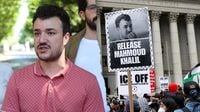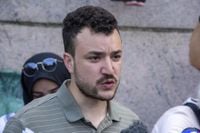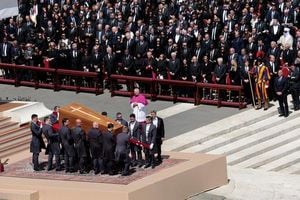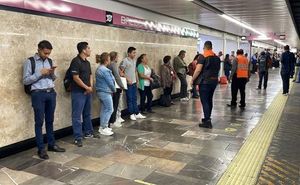Columbia University graduate Mahmoud Khalil's legal battle against his detention and potential deportation has taken a significant turn, as a New Jersey federal judge ruled on April 29, 2025, that Khalil can proceed with his lawsuit against the U.S. government. Khalil, a lawful permanent resident, claims he was unlawfully detained due to his political views expressed during pro-Palestinian protests on campus.
Judge Michael Fabiarz of the U.S. District Court for the District of New Jersey decided that his court would retain jurisdiction over the case, rejecting the federal government's argument that Khalil's claims should be dismissed based on provisions of the Immigration and Nationality Act. The judge emphasized that immigration courts lack the capacity to adequately address Khalil's constitutional claims, stating, "Immigration courts are not legally permitted to provide the relief ... that the Petitioner [Khalil] seeks here." This decision marks a crucial step in Khalil's fight for freedom and has broader implications for other individuals similarly affected by the Trump administration's policies.
Khalil's legal troubles began on March 8, 2025, when he was detained at his New York apartment. Following his arrest, he was transferred to an immigration detention facility in Louisiana, approximately 1,400 miles away from his home and family. His attorneys argue that this transfer was part of a retaliatory strategy against him for his advocacy of Palestinian rights.
In a previous ruling, federal judges had blocked Khalil's deportation in the absence of a court order, and Judge Fabiarz's latest decision allows him to challenge the legality of his detention in federal court. Amy Greer, one of Khalil's attorneys, expressed optimism, stating, "Today we moved one step closer to vindicating Mr. Khalil's rights by challenging his unlawful detention and the administration's unconstitutional and retaliatory actions against him."
Fabiarz's ruling comes amid significant public outcry and protests advocating for Khalil's release. His wife, Noor Abdalla, who recently gave birth to their first child, expressed relief at the court's decision, saying, "This is an important step towards securing Mahmoud's freedom. But there is still more work to be done." Abdalla's statement highlights the personal stakes involved in Khalil's legal battle, as she emphasizes the urgency of reuniting with her husband during this critical time.
As the case unfolds, the implications extend beyond Khalil himself. Noor Zafar, a senior staff attorney with the ACLU’s Immigrants’ Rights Project, remarked, "This is a huge step forward for Mahmoud and for the other students and scholars that the Trump administration has unlawfully detained in retaliation for their political speech." This sentiment resonates with many advocates who view Khalil's case as emblematic of a broader crackdown on dissenting voices within the United States.
Despite the court's ruling, the federal government continues to assert that Khalil's detention is justified. Secretary of State Marco Rubio, speaking from Shannon Airport in Ireland, stated that the case is "not about free speech," further complicating the narrative surrounding Khalil's arrest. The Department of Homeland Security (DHS) has accused Khalil of failing to disclose his prior employment with the Syrian office in the British Embassy and alleged that he has ties to Hamas, a claim Khalil vehemently denies.
In response to the government's allegations, Khalil's immigration attorney, Sabrine Mohamah, characterized the situation as "unjust as it is alarming," warning that it sets a dangerous precedent for free speech and political expression in the U.S. Mohamah's comments reflect a growing concern among civil liberties advocates regarding the potential for government overreach in targeting individuals based on their political beliefs.
As Khalil's legal team prepares to present their case, they are also pursuing motions to compel his return from Louisiana and to grant bail. If successful, these motions could allow Khalil to reunite with his family and continue advocating for Palestinian rights without the looming threat of deportation.
Ramzi Kassem, co-director of CLEAR, expressed hope for Khalil's future, stating, "The court's decision today clears the way for what really matters: continuing the legal fight to bring Mahmoud home so he can reunite with Noor and resume his defense of Palestinian rights." This perspective underscores the importance of Khalil's case not just for him personally, but for the broader movement advocating for Palestinian rights and free speech protections.
As the situation continues to develop, it remains to be seen how the courts will address the complex interplay between immigration law and constitutional rights. The ongoing legal battles highlight the critical need for vigilance in protecting the rights of individuals who may be targeted for their political beliefs.
In the meantime, supporters of Khalil are expected to continue their advocacy efforts, rallying around the cause of free speech and the rights of immigrants facing similar challenges. The outcome of Khalil's case could set a significant precedent for how the U.S. government handles cases involving political dissent and immigration law.
As the legal proceedings unfold, Khalil's plight serves as a stark reminder of the tensions between national security and individual rights in a rapidly changing political landscape. The implications of this case extend far beyond one individual, touching on fundamental issues of freedom of speech, due process, and the treatment of immigrants in the United States.
Ultimately, the fight for Mahmoud Khalil's freedom is emblematic of a larger struggle for justice and equality in a society grappling with its values and principles. As advocates continue to push for Khalil's release, the legal system will play a crucial role in determining the future of not only Khalil but also countless others who find themselves in similar circumstances.





